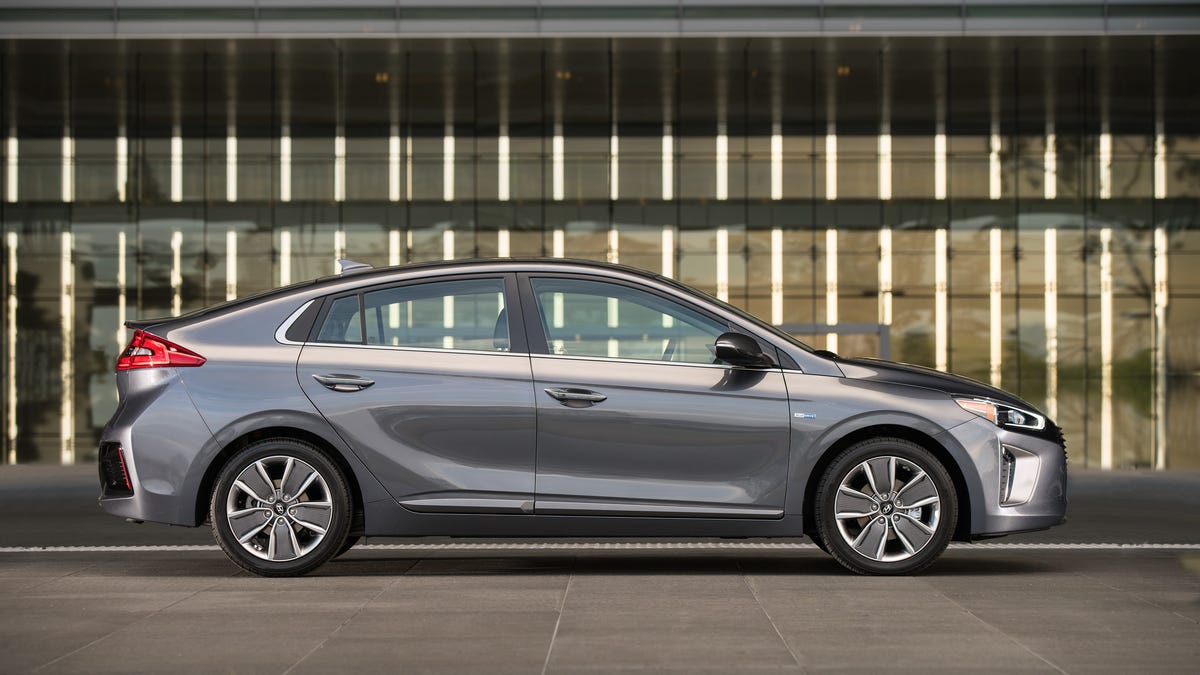Hyundai says Ioniq Hybrid to offer Prius-besting 58 mpg
Aerodynamic five-door would become the most fuel-efficient car sold in America without a plug.

Although Hyundai officials all but decline to talk about the competition by name, the automaker clearly has its eyes dead set on dethroning Toyota's Prius as America's eco-drive darling. The empirical evidence? The Korean automaker has just announced that its Ioniq Hybrid Blue will come to market early next year with an EPA-estimated 57 miles per gallon city, 59 highway and a combined mileage rating of 58. Those figures best the Toyota Prius Eco's 58 mpg city, 53 highway and 56 combined, and should be enough to make the Ioniq Hybrid the most fuel-efficient car sold in America without a plug.
The slipstream five-door Hybrid is powered by a 1.6-liter direct-injected gas engine with 104 horsepower and 109 pound-feet of torque, and it's backed by a 43-hp electric motor fed by a 1.56-kWh lithium ion battery. Combined total system output is pegged at 139 hp, well north of the benchmark Toyota's 121 hp. Interestingly, unlike most hybrids that utilize an electronic continuously variable transmission, the Ioniq uses a six-speed dual-clutch transmission, a type of gearbox known more for sporty performance than refinement. (Hyundai officials claim using the DCT will enable a more fun-to-drive character, but previous Sonata Hybrids utilized the same style of transmission, and in my experience, they largely failed to deliver on that promise).
In a novel strategy, the Ioniq will also be available in plug-in hybrid (PHEV) and pure-electric formats, making Hyundai the first automaker to offer all three powertrain types in a single model. Spinning all three off a common architecture helps with development costs and economies of scale, but it will also likely prove to be a challenge for Hyundai's marketing team and its dealer network, who will likely have to do a fair amount of hand-holding and explaining when courting potential customers.
The 2017 Hyundai Ioniq Hybrid's shape is less controversial than Toyota's flamboyant new Prius.
The PHEV model, which will line up against Toyota's new Prius Prime when it arrives next summer, relies on the same gas engine as the Hybrid, but includes a more powerful 60-hp electric motor backed by a much larger 8.9-kWh battery pack. Total system power has not yet been revealed, but Hyundai says the model will have an electric-only range in excess of 27 miles, edging the 2017 Prius Prime's 25-mile figure. Officials also point to the Ioniq PHEV's larger cargo capacity, quicker charge time, lifetime battery warranty and seating for five as trump cards over its four-seat Toyota rival.
Hyundai also notes its Ioniq Electric will arrive by the end of this year with an 88-kW electric motor (120-hp equivalent) paired with a 28-kWh battery pack, enough for a total driving range in excess of 124 miles and an MPGe rating of 136. Those figures better the Nissan Leaf and Volkswagen E-Golf, but are well shy of Chevrolet's new Bolt, whose larger battery pack promises a range of 238 miles. At a media event on Thursday at the Hyundai America Technical Center (HATCI) in Superior Township, Michigan, company officials reiterated that a 200+ mile EV is coming for early 2018.
In the end, the Ioniq's value to Hyundai will likely be more as a green-car halo and engineering showcase than it is as a potential profit maker. Despite the significant proliferation of hybrid and plug-in vehicles across the auto industry, sales of alternative-fuel models remain both flat and disappointing, depressed by low fuel prices and US consumers' seemingly insatiable appetite for SUVs and pickups. According to Hyundai, through October of this year, sales of eco cars sit at just 2.79 percent of America's total new vehicle market, only around a half-point better than the 2.25 percent share they had way back in 2011.
The automaker believes that as millennial buyers displace baby boomers as America's largest group of new vehicle buyers that alt-fuel models will gain in popularity, but even if that hope fails, it still needs cars like the Ioniq to comply with future emissions standards. If that's not enough, Andy Freels, president of HATCI, says the Ioniq will "serve as our launchpad for Level 4 Autonomy," something we hope to hear a bit more about it at CES in January.

